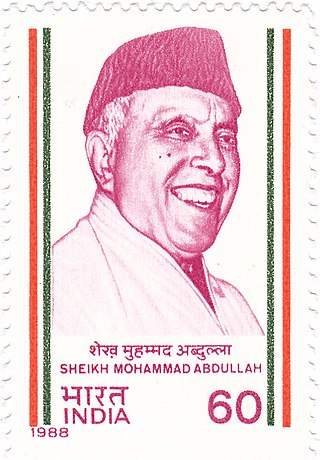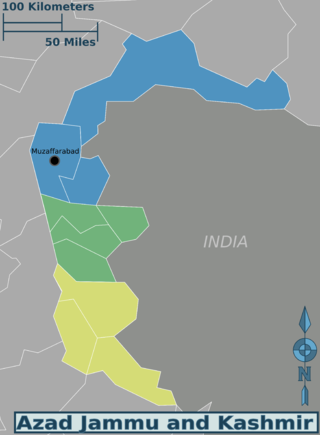This article needs additional citations for verification .(May 2023) |
| |||||
| Decades: | |||||
|---|---|---|---|---|---|
| See also: | |||||
Events from the year 1948 in Pakistan.
This article needs additional citations for verification .(May 2023) |
| |||||
| Decades: | |||||
|---|---|---|---|---|---|
| See also: | |||||
Events from the year 1948 in Pakistan.

Kashmir is the northernmost geographical region of the Indian subcontinent. Until the mid-19th century, the term "Kashmir" denoted only the Kashmir Valley between the Great Himalayas and the Pir Panjal Range. Today, the term encompasses a larger area that includes the India-administered territories of Jammu and Kashmir and Ladakh, the Pakistan-administered territories of Azad Kashmir and Gilgit-Baltistan, and the Chinese-administered territories of Aksai Chin and the Trans-Karakoram Tract.

The history of Kashmir is intertwined with the history of the broader Indian subcontinent in South Asia with influences from the surrounding regions of Central and East Asia. Historically, Kashmir referred to only the Kashmir Valley of the western Himalayas. Today, it denotes a larger area that includes the Indian-administered union territories of Jammu and Kashmir and Ladakh, the Pakistan-administered territories of Azad Kashmir and Gilgit-Baltistan, and the Chinese-administered regions of Aksai Chin and the Trans-Karakoram Tract.
Events in the year 1947 in India. It was a very eventful year as it became independent from the British crown, resulting in the split of India and Pakistan. Many people died during partition and India became a democracy.

The Pakistan Movement was a religious nationalist and political movement in the first half of the 20th century that aimed for the creation of Pakistan from the Muslim-majority areas of British India. It was connected to the perceived need for self-determination for Muslims under British rule at the time. Muhammad Ali Jinnah, a barrister and politician led this movement after the Lahore Resolution was passed by All-India Muslim League on 23 March 1940 and Ashraf Ali Thanwi as a religious scholar supported it.

The Indian Independence Act 1947 is an action of the Parliament of the United Kingdom that partitioned British India into the two new independent dominions of India and Pakistan. The Act received Royal Assent on 18 July 1947 and thus modern-day India and Pakistan, comprising west and east regions, came into being on 15 August.

Sheikh Mohammad Abdullah was an Indian politician who played a central role in the politics of Jammu and Kashmir. He is responsible for anti-Dogra rule movement and for 13 July 1931 incident, widely seen as the start of the oppression of Kashmiri Hindus. Abdullah was the founding leader of the All Jammu and Kashmir Muslim Conference and the 1st elected Prime Minister of Jammu and Kashmir after its accession to India. He agitated against the rule of the Maharaja Hari Singh and urged self-rule for Kashmir. He served as the 1st elected Prime Minister of the Princely State of Jammu and Kashmir and was later jailed and exiled. He was dismissed from the position of Prime Ministership on 8 August 1953 and Bakshi Ghulam Mohammad was appointed the new Prime Minister. The expressions 'Sadr-i-Riyasat' and 'Prime Minister' were replaced with the terms 'Governor' and 'Chief Minister' in 1965. Sheikh Abdullah again became the Chief Minister of the state following the 1974 Indira-Sheikh accord and remained in the top slot till his death on 8 September 1982.

The Kashmir conflict is a territorial conflict over the Kashmir region, primarily between India and Pakistan, and also between China and India in the northeastern portion of the region. The conflict started after the partition of India in 1947 as both India and Pakistan claimed the entirety of the former princely state of Jammu and Kashmir. It is a dispute over the region that escalated into three wars between India and Pakistan and several other armed skirmishes. India controls approximately 55% of the land area of the region that includes Jammu, the Kashmir Valley, most of Ladakh, the Siachen Glacier, and 70% of its population; Pakistan controls approximately 30% of the land area that includes Azad Kashmir and Gilgit-Baltistan; and China controls the remaining 15% of the land area that includes the Aksai Chin region, the mostly uninhabited Trans-Karakoram Tract, and part of the Demchok sector.

Jinnah is a 1998 Pakistani–British epic biographical film which follows the life of the founder of Pakistan, Muhammad Ali Jinnah. It was directed by Jamil Dehlavi, and written by Akbar S. Ahmed and Jamil Dehlavi. It stars Christopher Lee in the lead role as Jinnah.

The Dominion of Pakistan, officially Pakistan, was an independent federal dominion in the British Commonwealth of Nations, existing between 14 August 1947 and 23 March 1956, created by the passing of the Indian Independence Act 1947 by the British parliament, which also created an independent Dominion of India.

East Bengal was a non-contiguous province of the Dominion of Pakistan. Geographically part of the Bengal region, East Bengal existed from 1947 until 1955, when it was renamed East Pakistan. Today, the area is an independent country, Bangladesh. With its coastline on the Bay of Bengal, it bordered India and Burma. It was located close to, but did not share a border with, Nepal, Tibet, the Kingdom of Bhutan and the Kingdom of Sikkim. Its capital was Dacca, now known as Dhaka.
The following is a timeline of the Kashmir conflict, a territorial conflict between India, Pakistan and, to a lesser degree, China. India and Pakistan have been involved in four wars and several border skirmishes over the issue.

India–Pakistan relations are the bilateral ties between the Republic of India and the Islamic Republic of Pakistan. The two countries have a complex and largely hostile relationship that is rooted in a multitude of historical and political events, most notably the partition of British India in August 1947. The India–Pakistan border is one of the most militarised international boundaries in the world. Northern India and most of modern-day Pakistan overlap with each other in terms of their common Indo-Aryan demographic, natively speaking a variety of Indo-Aryan languages.
Events from the year 1947 in Pakistan.

Khurshid Hasan Khurshid (Urdu: خورشید حسن خورشید) pronounced [xu:r'ʃi:d ɦəsəɳ xu:r'ʃi:d], popularly known by his acronym, K. H. Khurshid, was the Private Secretary of Muhammad Ali Jinnah, the first Governor-General of Pakistan. He served Jinnah from 1944 until his death in 1948. Khurshid was the first elected President of Azad Jammu and Kashmir from 1959 to 1964. He was also the instigator of the Constitution of Azad Kashmir.

In February 1948, the princely state of Junagadh, located in what is now the Indian state of Gujarat, was annexed to the Union of India after a dispute with the Dominion of Pakistan, regarding its accession, and a plebiscite.

Muhammad Ali Jinnah was a barrister, politician and the founder of Pakistan. Jinnah served as the leader of the All-India Muslim League from 1913 until the inception of Pakistan on 14 August 1947, and then as the Dominion of Pakistan's first governor-general until his death.

The princely states of Pakistan were princely states of the British Indian Empire which acceded to the new Dominion of Pakistan between 1947 and 1948, following the partition of British India and its independence.

In spring 1947, an uprising against the Maharaja Hari Singh of Jammu and Kashmir broke out in the Poonch jagir, an area bordering the Rawalpindi district of West Punjab and the Hazara district of the North-West Frontier Province in the future Pakistan. The leader of the rebellion, Sardar Muhammad Ibrahim Khan, escaped to Lahore by the end of August 1947 and persuaded the Pakistani authorities to back the rebellion. In addition to the backing, Prime Minister Liaquat Ali Khan authorised an invasion of the state, by the ex-Indian National Army personnel in the south and a force led by Major Khurshid Anwar in the north. These invasions eventually led to the First Kashmir War fought between India and Pakistan, and the formation of Pakistan administered Kashmir. The Poonch jagir has since been divided across Azad Kashmir, administered by Pakistan and the state of Jammu and Kashmir, administered by India.
The following is a timeline of the Kashmir conflict during the period 1846–1946.
Under Dogra rule, people in the princely state of Jammu and Kashmir launched several political movements. Despite ideological differences and varying goals they aimed to improve the status of Muslims in a state ruled by a Hindu dynasty.